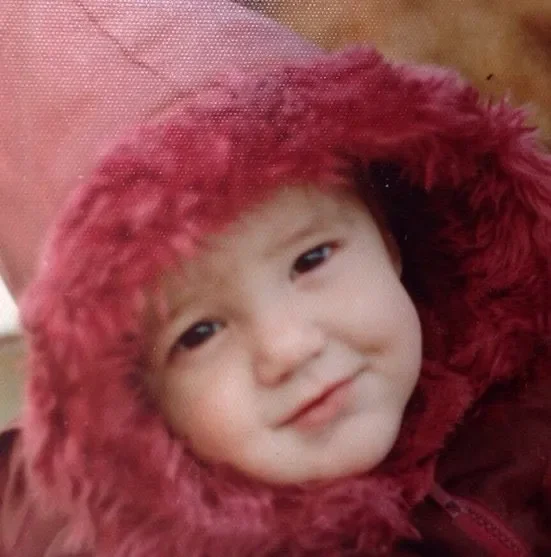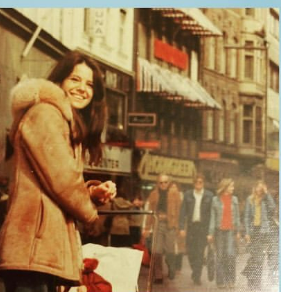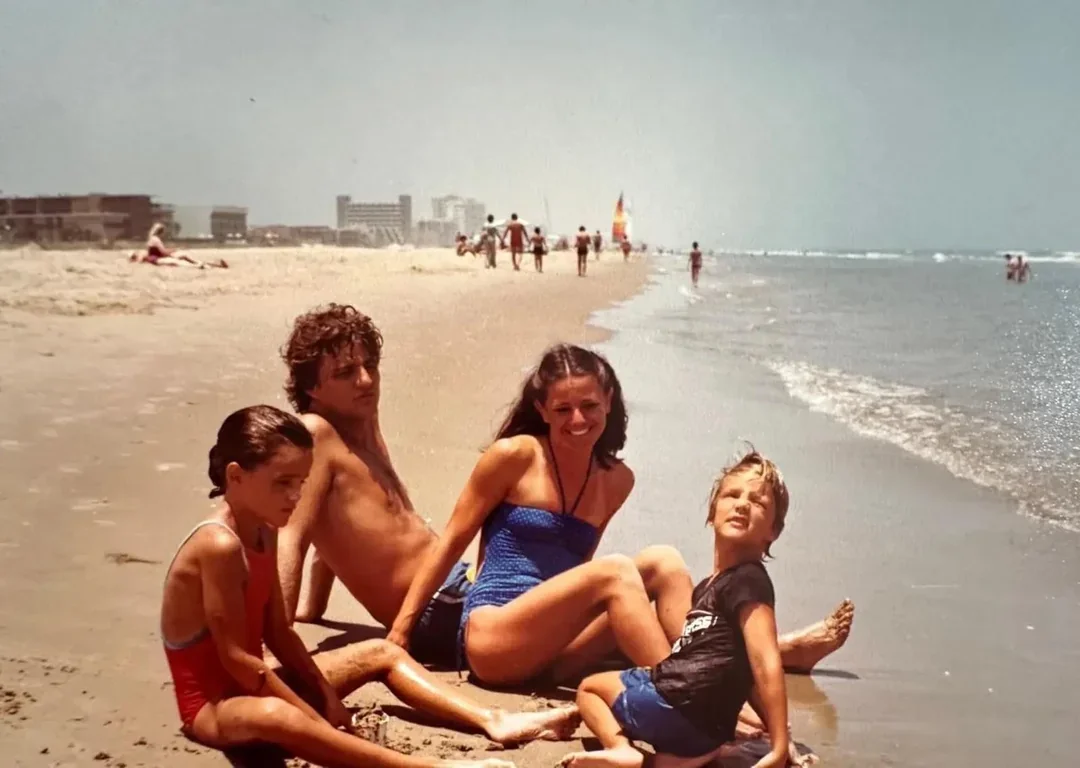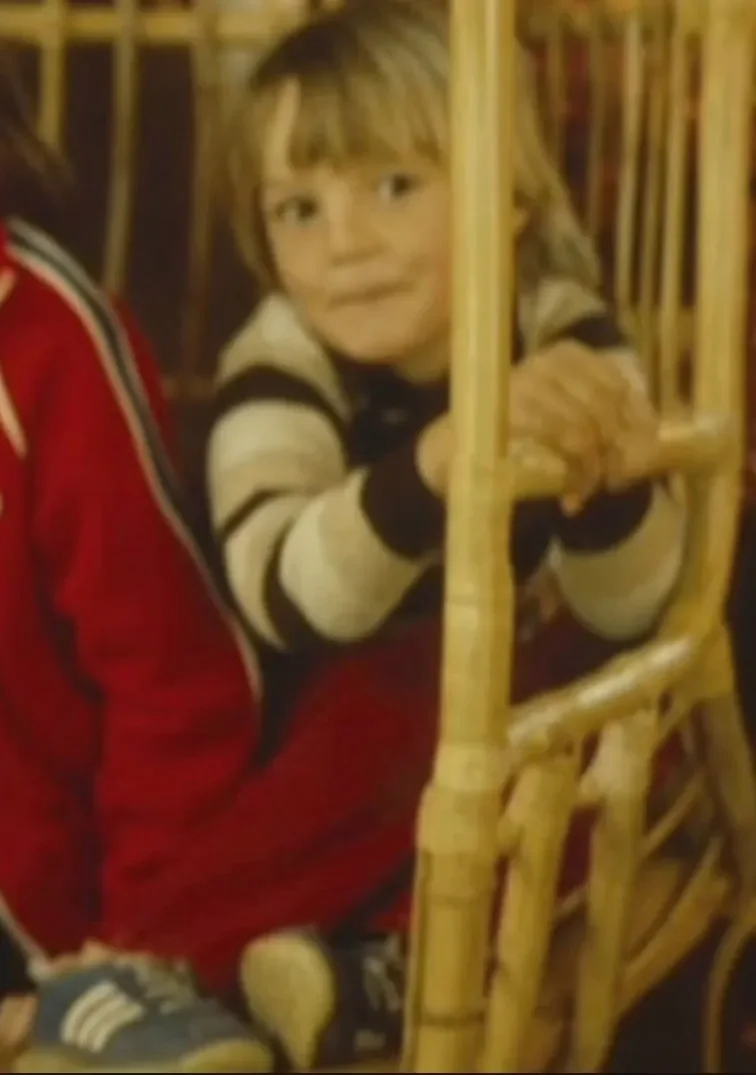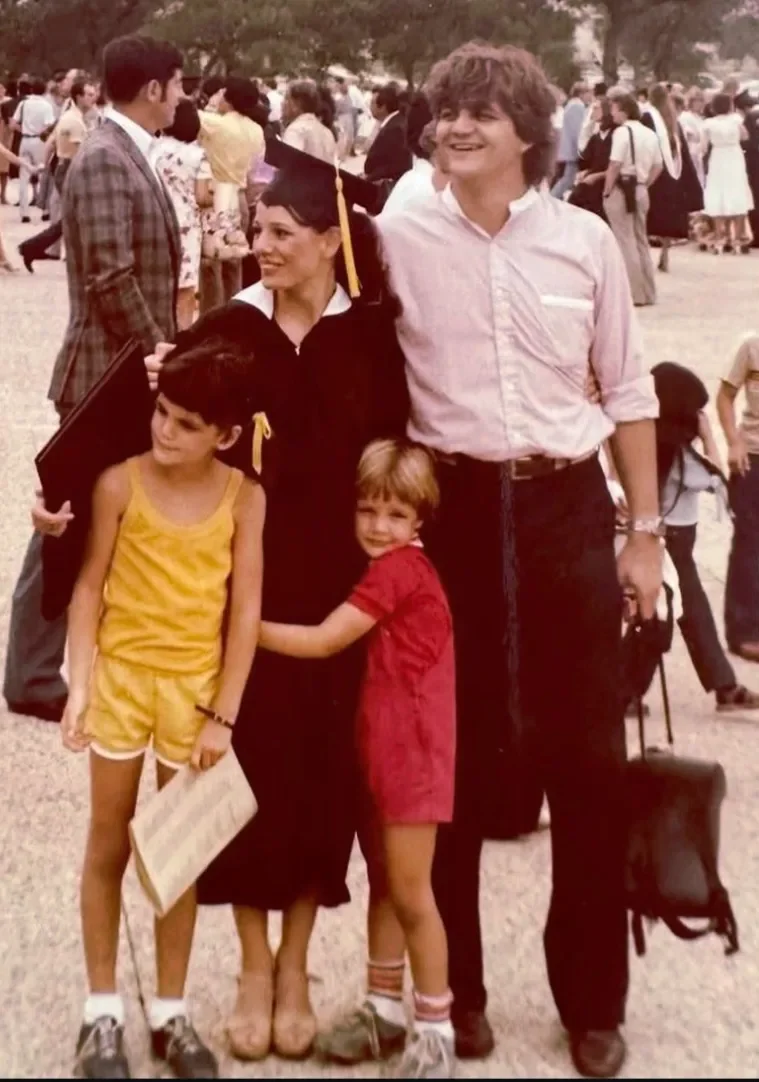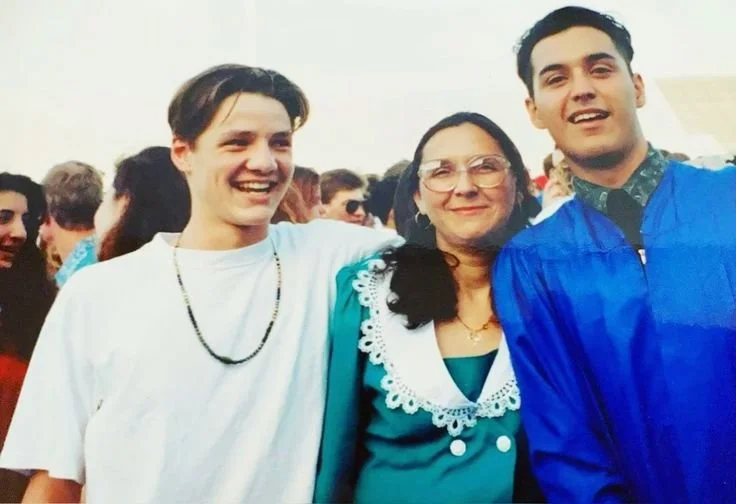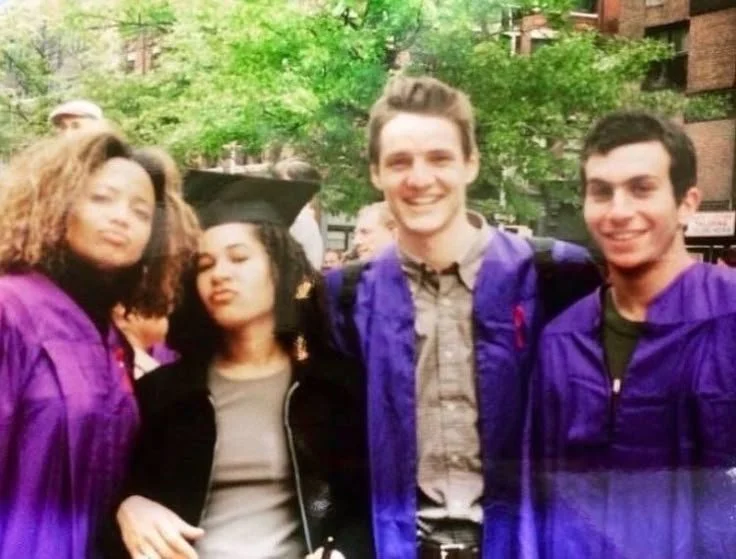Pedro Pascal: A Life in Motion
Full name: José Pedro Balmaceda Pascal
Born: April 2, 1975 — Santiago, Chile
Pronouns: He/Him
Languages: English, Spanish
Profession: Actor (TV, film, theater)
Roots and Revolution: Family & Early Life
Pedro Pascal was born in Santiago, Chile, into a family whose lives were deeply shaped by the political upheaval of the 1970s. His mother, Verónica Pascal Ureta, was a compassionate child psychologist and academic, and his father, José Balmaceda, a dedicated fertility specialist. Both were part of an educated, idealistic generation who stood in quiet opposition to the Pinochet dictatorship that took power following the 1973 military coup.
In 1975, Pedro, then José Pedro Balmaceda Pascal entered the world during a time of escalating danger. A cousin of his mother, Andrés Pascal Allende, a well-known political figure and nephew of former President Salvador Allende, had been hidden by the family before fleeing. When Chilean authorities attempted to arrest Pedro's father, "Pepe," at the José Joaquín Aguirre Hospital in October 1975, he narrowly escaped by jumping off the roof. This event marked the beginning of the family's harrowing journey into exile.
At just six months old, Pedro and his three-year-old sister, Javiera, were separated from their parents for safety. They were left in the care of their great-aunt "Aunt Juani" while their parents took refuge in the Venezuelan Embassy on Bustos Street, near the home of Pedro's cousin Paula Coddou. Pedro's parents were not even able to attend his baptism, which was performed in Paula's family garden by Father Gerardo Whelan, rector of Saint George's College.
The children were later reunited with their parents under the guidance of the International Red Cross, which arranged for them to be taken directly to the airport instead of leaving the embassy. This strategy avoided having their passports stamped with the "L" for "limited to circulate" a designation that would have marked them as exiles and made future travel to Chile difficult.
Timeline of Exile and Resettlement
April 2, 1975: Pedro is born in Santiago.
October 1975: Pedro's father evades arrest and the family begins hiding.
Late 1976: The Balmaceda Pascals arrive in Aarhus, Denmark, where they live for about a year.
1977: The family resettles in San Antonio, Texas, supported by a scholarship from the Rockefeller Foundation, which allows Pedro's father to continue his medical studies. Verónica later earns a PhD in Child Psychology.
Though he would grow up primarily in the U.S., Pedro's ties to Chile and its people remained vibrant. His parents ensured Spanish was spoken at home and that their children understood their heritage. Pedro would return to Chile multiple times throughout his childhood and early teens, and these visits became formative experiences.
In a tender and detailed essay published in La Tercera, Pedro’s cousin Paula recalls his baptism as the first time she met him, he was a crying baby with large, dark eyes. She later remembered another moment outside the Venezuelan embassy when Pedro and Javiera, held in their parents' arms, were briefly visible to relatives watching from the street. That image stayed with her for life.
Pedro was embraced by cousins, aunts, and uncles who made sure he never felt like a stranger. He would run barefoot through gardens, invent imaginary worlds, and immerse himself in Chilean life. Paula remembers him as “shy, affectionate, and imaginative", a child who felt things deeply and soaked up every detail around him.
One especially sweet memory involves Pedro choosing to stay with Paula’s family because he had developed a crush on her younger sister. He spoke about that visit later in life, telling Paula it had felt like a dream. Chile, for Pedro, was more than a homeland; it was a place of light, comfort, and deep familial love.
Education and Early Dreams
Pedro’s childhood was not only shaped by exile and reinvention, but by an early passion for storytelling. Initially a competitive swimmer, ranked in the state of Texas, he gave up the sport at age 11 to pursue drama and theater, a decision that would change his life.
As he grew up in the U.S., Pedro's educational path reflected both the challenges of adaptation and the blossoming of his artistic passion. He attended:
Colonies North Elementary on the north side of San Antonio, Texas, where he began his education and trained as a competitive swimmer.
Corona del Mar Middle School, where he experienced bullying, an early and difficult chapter that shaped his resilience and empathy.
Los Alamitos High School in Orange County, California, where his passion for acting began to take shape through school plays and drama classes. He was a student there before graduating in 1993. During that time, he also participated in the Orange County School of the Arts (OCSA), balancing both traditional and performing arts education.
Orange County School of the Arts (OCSA) — a performing arts charter school in Santa Ana, California. There, he found a community that nurtured his dramatic instincts and introduced him to the world of classical and experimental theater.
In 1992, Pedro attended the National High School Institute (NHSI)'s Cherubs theatre program at Northwestern University, a prestigious summer program for young actors.
After high school, he made the leap to New York City, enrolling in:
NYU Tisch School of the Arts — one of the most prestigious drama programs in the U.S. Pedro graduated in 1997 with a Bachelor of Fine Arts (BFA) in acting.
While at NYU, Pedro trained at the Experimental Theatre Wing and became heavily involved in the city’s off-Broadway theater scene. These formative years were filled with hustle: auditioning by day, performing by night, and often scraping by financially.
While studying acting at New York University's Tisch School of the Arts, Pedro Pascal studied abroad in Madrid, Spain, as part of an anthropology course. "I am in love with Spain," he said in a later interview. "I came here to do a study on the city for my anthropology course at the University of New York. I loved it so much that when I finished, I stayed two more months in Madrid, working, going out, going to parties."
During his time there, he met a charming choreographer named Dani Pannullo, who would later found his own dance company. "He gave me work at his club, at his parties," Pedro recalled. "It was in the House of Devotion, which was held every Thursday in Morocco nightclub." Though he danced, he clarified that it was not a strip club: "I did not take my clothes off, but I danced and wore silver hair."
It was a pivotal and unorthodox chapter in his early adulthood, an example of his resourcefulness, adventurous spirit, and willingness to do whatever it took to survive while pursuing his dreams.
His work ethic, sharpened by personal loss and cultural resilience, kept him going during the years of small roles and near-anonymity.
From Stage Work to Setbacks: The Struggling Actor Years
After graduating from NYU in 1997, Pedro Pascal remained in New York, determined to carve out a career as a working actor. One of his earliest and most memorable experiences was his very first audition, which he later recalled during a conversation with Sarah Paulson. “My first audition was for Primal Fear (1996),” he said. “I was totally in over my head. I auditioned for that in New York and then I went to L.A.” Out of college, Pedro was working hard on auditions and had several promising leads. One of his earliest and most memorable experiences was his very first audition, which he later recalled during a conversation with Sarah Paulson for Interview Magazine. “My first audition was for Primal Fear (1996),” he said. “I was totally in over my head. I auditioned for that in New York and then I went to L.A.” He picked up small television roles throughout the late 1990s and early 2000s, appearing in shows like Touched by an Angel and Buffy the Vampire Slayer, where he played the ill-fated Eddie in the premiere episode of Season 4. He also auditioned for roles on series like Dark Angel, which was one of his most promising opportunities at the time. According to Vanity Fair, he even made it to the final round of auditions to play the love interest of Jessica Alba's character, an encouraging sign that he was close to breaking through. But just as that opportunity seemed within reach, tragedy struck in early 2000 with the sudden death of his mother, Verónica Pascal. The loss profoundly disrupted his momentum and reshaped his life and career.
The death of his mother, Verónica Pascal, on February 4, 2000, was a devastating personal loss for Pedro. At just 24 years old, he was still navigating the early days of his acting career when he received the news. Overwhelmed by grief, Pedro returned to Chile for her funeral. He has spoken of the period as one of profound disorientation and sorrow, describing how difficult it was to preserve her memory without being overcome by the pain of her passing.
After returning to the U.S., Pedro found himself at a crossroads. As a tribute to Verónica—the person who had most believed in him—he adopted her last name professionally.
After returning to New York City following his mother’s death, Pedro lost both his agent and manager, a critical setback for any working actor. But almost immediately after that professional blow, he was cast in the play Fallen, where he portrayed a character named 'Pascal' and was credited as Alexander Pascal, a meaningful early use of his professional surname, chosen in tribute to his late mother.
Still, consistent work remained elusive. He remained deeply committed to his craft, turning to the theater scene in New York where he found both artistic refuge and community. He acted in and directed numerous stage productions, developing a reputation as a thoughtful and compelling performer, particularly in off-Broadway circles. His theater work, though not always lucrative, helped him hone his skills and build the network that would eventually lead to his breakout. Among the highlights were his performances in Ghosts at the Shakespeare Theatre Company, where he played Oswald Alving opposite Jane Alexander, and Maple and Vine at Playwrights Horizons, where he portrayed Roger in a sharp satire about nostalgia and conformity. He also earned acclaim in Some Men by legendary playwright Terrence McNally, who took a special interest in Pedro’s career. McNally not only mentored him during the run of the show but also taught him, as Pedro fondly recalled, how to order a martini the correct way. These productions solidified his reputation in New York’s downtown theater scene, respected for his intensity, vulnerability, and collaborative energy.
For a full list of Pedro Pascal’s stage performances and directing credits, click here to view his complete theater résumé.
Persistence, Craft, and Unexpected Doors
During this period, Pedro’s life revolved around his work in New York’s downtown theater scene. He lived in a seventh-floor apartment of an East Village walk-up. Every night he’d have a cigarette on his fire escape and watch the moon rise between the Twin Towers. After 9/11, he moved to Red Hook with his faithful dog , Gretta.
Pedro also became part of a close-knit circle that included Sarah Paulson, Oscar Isaac, and other up-and-coming talents who supported one another emotionally and artistically. During pilot season, he would scrape together money to fly to Los Angeles, hoping for a break in television, each trip a gamble and a leap of faith driven by persistence.
In a Vanity Fair cover story, Pedro reflected on how deeply those friendships sustained him during those lean years. "I was getting cast in stuff here and there, but nothing stuck," he shared. "I was waiting tables and walking dogs, temping... all the cliches."
Despite the struggle, Pascal’s talent didn’t go unnoticed. His work in theater allowed him to explore a wide range of characters and sharpen his emotional depth and stage presence. He built an impressive résumé with performances in plays by writers like John Kolvenbach, Roberto Aguirre-Sacasa, Nilo Cruz, and Terrence McNally.
Beyond acting, Pedro also directed and wrote for the stage during this creative stretch. In 2008, he directed underneathmybed by Florencia Lozano for LAByrinth Theater Company, which premiered at the LAB Summer Intensive and was later featured in The Public’s Live Nude Plays. In 2009, he directed Lozano’s Girl in Window for LAB and debuted his own original play, Flaca Loves Bone, at the LAB Summer Intensive (initially directed by Sarah Silverman), later taking on directorial duties himself for LAB’s Punch the Clock Festival. In 2010, Flaca Loves Bone had a staged reading at Rattlestick Playwrights Theater, where Pedro also directed Killing Play by David Anzuelo and led the full production of Daniel Talbott’s Yosemite, which he directed from its reading in 2010 through its 2012 run. In 2012, he also directed Black Lace by John Patrick Shanley for the LAByrinth Theater Company’s Barn Series at The New Ohio Theatre.
These years built not only his skill set but his reputation within the industry—as someone who was reliable, intuitive, and intensely watchable. He wasn’t yet a star, but he was an actor’s actor: serious about the work, deeply collaborative, and profoundly invested in storytelling.
From Off-Broadway to Oberyn Martell: The Breakout Years
Years of persistence and stage-honed talent finally began to pay off in the 2010s. Though Pedro had booked numerous small roles on television, appearing in episodes of Law & Order, Without a Trace, CSI, The Good Wife, White Collar, Nikita, and Brothers & Sisters—he remained under the radar for much of the early part of the decade.
Then, in 2014, everything changed with one explosive role: Oberyn Martell, the charismatic and vengeful Prince of Dorne in HBO’s Game of Thrones. Though he appeared in only one season, Pascal’s electric performance as the “Red Viper” made an indelible mark on fans and critics alike. His combination of grace, danger, and vulnerability instantly elevated his profile in the industry and among global audiences.
The opportunity came with a little help from friends, Sarah Paulson and Amanda Peet. Paulson, one of Pedro's closest friends, helped get his audition tape into the right hands, while Peet, married to Game of Thrones co-creator David Benioff, championed him for the part. Their support played a crucial role in getting him cast. That role became the turning point.
Following Game of Thrones, Pascal landed a lead role as DEA agent Javier Peña in Netflix’s acclaimed series Narcos (2015–2017), which solidified him as a commanding on-screen presence. He followed that with memorable turns in The Mentalist, Graceland, Bloodsucking Bastards, and Kingsman: The Golden Circle, showing off his versatility in both dramatic and comedic roles.
Pascal’s long road through the theater trenches and television guest roles had finally delivered him to stardom, but the best was still yet to come.
The Mandalorian, The Last of Us, and Global Recognition
Pascal’s rise accelerated dramatically with his casting in the Star Wars universe. In 2019, he took on the role of Din Djarin, the titular bounty hunter in Disney+’s groundbreaking series The Mandalorian. Created by Jon Favreau, the series helped launch Disney’s streaming platform and quickly became a cultural phenomenon. Though his face was often hidden beneath the Mandalorian helmet, Pedro’s voice, body language, and emotional restraint brought surprising depth and humanity to the character. His performance earned him critical acclaim, solidifying him as a leading man with global appeal.
Favreau and executive producer Dave Filoni reportedly first took notice of Pascal after seeing his captivating performance in the indie sci-fi film Prospect (2018), where he starred opposite Sophie Thatcher. Impressed by his ability to portray complexity, vulnerability, and strength, they invited him to a meeting about "something Star Wars." When Pedro arrived, he saw storyboards for The Mandalorian covering the walls and assumed he might be considered for a minor role or perhaps a droid, or as Pedro said a bug. To his surprise, they offered him the lead role of Din Djarin, a twist he hadn't expected, but one that would change the trajectory of his career forever.
In 2023, Pascal’s momentum continued with another iconic protector role, Joel Miller in HBO’s adaptation of The Last of Us, based on the popular video game franchise. The series, co-created by Craig Mazin and Neil Druckmann, premiered to rave reviews. Pascal’s performance as a hardened, grieving survivor paired with Bella Ramsey’s Ellie struck an emotional chord with audiences and critics alike. The role earned him nominations for the Emmy Award, Golden Globe, and Critics Choice Award, and in 2024, he won a Screen Actors Guild (SAG) Award for Male Actor in a Drama Series, thanks to his role in The Last of Us. Pascal, who admitted he didn’t expect to win after losing the Golden Globe and Emmy to Succession’s Kieran Culkin, gave a candid and memorable speech. “I’m a little drunk. I thought I could get drunk,” he confessed to the audience. “I’m making a fool of myself but thank you so much for this! I’ve been in the union since 1999 so this is an incredible fucking honor. To the nominees, all of you, I can’t remember any of your names right now.”
These two characters Din Djarin and Joel Miller, cemented Pascal’s reputation as a compelling figure of stoic tenderness: complex, vulnerable, and fiercely protective. His portrayal of deeply wounded, emotionally layered men has resonated with viewers across generations and platforms.
Adding to his cultural resonance, Pascal made his Saturday Night Live hosting debut in 2023. His appearance was widely praised for its mix of humor, self-awareness, and charm, earning him an Emmy nomination for Outstanding Guest Actor in a Comedy Series. The episode became a fan favorite and further showcased his comedic timing and range.
Simultaneously, Pedro became a fashion icon and frequent magazine cover star, known for his bold red carpet choices and irreverent charm in interviews. In 2023, TIME named him one of the 100 Most Influential People in the world.
With upcoming projects including major film releases, continued seasons of The Mandalorian and The Last of Us, and a role in the Marvel Cinematic Universe as Reed Richards in Fantastic Four, Pedro Pascal has emerged not just as a star—but as one of the most beloved and distinctive actors of his generation.
Film Stardom, Reed Richards, and What's Ahead
From scene-stealing turns in blockbusters like The Unbearable Weight of Massive Talent, where he starred opposite Nicolas Cage, to his upcoming debut as Reed Richards (Mr. Fantastic) in Marvel’s Fantastic Four, Pedro Pascal’s film career continues to soar. He’s shown remarkable range—from comedy to action to drama—earning the respect of industry veterans and the adoration of audiences across the globe.
He continues to balance high-profile projects with smaller, character-driven roles, never losing sight of the emotional truth that anchors his performances. Whether he’s behind a mask in a galaxy far, far away or tenderly guiding a lost girl through an apocalyptic wasteland, Pascal brings an honesty and warmth that transcends genre.
More than just a performer, he has become a cultural touchstone, a symbol of resilience, authenticity, and creative passion. Through every twist of fate and triumph hard-won, Pedro Pascal remains deeply connected to his roots, his family, and the people who helped him along the way.
It’s clear that the road ahead for Pedro is as bright as it is expansive. And for those who have followed his journey, from Chile to the stage, to Westeros, to the stars, it’s been nothing short of a joy to witness his rise.
And still, the best is yet to come. ❤️
We’ll be cheering him on every step of the way.
If you want to stay up to date on Pedro’s projects, interviews, and fan community moments, subscribe to The Pascal Pulse newsletter and follow @StainsOfPascal on Instagram for curated updates, rare content, and joyful chaos.
We have these to look forward to:
Star Wars: The Mandalorian and Grogu (Post-production, 2026)
Avengers: Doomsday – Reed Richards / Mister Fantastic (In Production, 2026)
Avengers: Secret Wars – Reed Richards / Mister Fantastic (In Development, 2027)
Behemoth! from writer-director Tony Gilroy for Searchlight Pictures (Filming begins Fall 2025 in LA)
De Noche from Todd Haynes, produced by Killer Films (Filming begins Early 2026 in Mexico)
Disclaimer: This fan-written biography is based on publicly available sources. It is not endorsed or affiliated with Pedro Pascal or his representatives.
